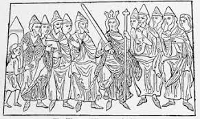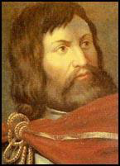The First English Parliament
The first Parliament in England that resembles today's Parliament met on January 20, 1265, at the behest of a Frenchman. 
The idea of a king or monarch ruling in England was a very old one by this time. The idea of a monarch's having a ruling council was almost as old. Record from as early as the 8th Century show that Anglo-Saxon rulers occasionally or regularly convened a Witan, made up of nobles and/or fighters who advised a ruler on matters of war and policy. Records also show that rulers would issue a call for a Witangemot, or gathering of the Witan, suggesting that this council did not sit in session all of the time. The Witan met in several locations around England but mostly in the south. The Norman Conquest put an end to Anglo-Saxon rule in England, but Norman rulers kept several of the ideas of governing employed by the people they had conquered. The idea of a strong king ruling with a firm hand extended through the reign of William the Conqueror and his descendants, particularly Henry II, who ended up owning much of France. War with France cost money, of course, and Henry and his successor sons were able to keep on fighting against France as long as their nobles believed that it was the right thing to do (meaning that they would continue to pay for the prosecution of those wars). Henry II's oldest son, Richard I, led a large number of soldiers into the Middle East on the Third Crusade in an effort to retake some of that land from Muslim armies. Richard was captured, and his mother, Eleanor of Aquitaine, had to pay an extremely large ransom to get him released. While Richard was away, his brother John was nominally in charge of the kingdom. When Richard died, John became king and tried to follow in his famous father's and brother's footsteps. John was not nearly as successful as either of the two former kings militarily; in fact, John ended up losing all of the lands that his father had claimed. At the same time, John became reliant more and more on taxes, not only to pay for the wars that he kept pursuing but also to help repay the debt that the crown still owed for Richard's ransom and for other expenses. A group of nobles had finally had enough of John's demands and, in 1215, rebelled. They forced John to accept the terms of Magna Carta, which put an end to several of John's favorite tax schemes. John died not long after, and his son became Henry III. This monarch reissued Magna Carta in 1225, in exchange for some new taxes. 
Henry III was only 9 when he ascended to the throne. He brought back the idea of the Witan, after a fashion. One of the advisors that Henry depended on most heavily was Simon de Montfort (left), a French noble who had come to the English court and ended up marrying Henry's sister, Eleanor. He even had a title, the Earl of Leicester. Simon was soon a key advisor to the king, who had the support of many of England's barons for a time. The king and the barons had another falling out a few decades later. By 1258, the barons had had enough and took Henry to task, reminding him that he needed their support in order to govern effectively. Henry agreed to a restatement of Magna Carta, known as the Provisions of Oxford, which created a council of 15 nobles who would be his advisors. One of those nobles was his brother-in-law, Simon de Montfort, the Earl of Leicester. Henry tired of seeking his council's advice and dismissed them in 1261, reasserting personal rule. This was not a popular with many people, particularly in London. As well, Henry made many barons angry enough that they chose to rebel. The Second Barons War began in 1264. (The First Barons War was a struggle between nobles and King John, after John renounced Magna Carta.) By this time, Simon de Montfort had become disillusioned with Henry III. It was de Montfort who led an armed rebellion against the king. The two sides met in a fierce battle near the town of Lewes in 1264. The forces of de Montfort were victorious, even capturing Henry and his son, Edward. The victorious barons forced Henry to relinquish much of his power; after this, Montfort took on all the trappings of a monarch for a time. 
Acting in the king's name but with a purpose all his own, de Montfort issued a call for a Parliament. Unlike the Witans of old, however, which were made up of only nobles, this gathering was to include commoners as well. Also, de Montfort called for men to come from many major cities, not just a few select places. The Parliament first met on January 20, 1265, at the Palace of Westminster in London. Henry III was in attendance. The Parliament met off and on for another few months, then dispersed. It was not until long after that the idea of a Parliament meeting regularly in session as put into practice. |
|
Social Studies for Kids
copyright 2002–2025
David White




